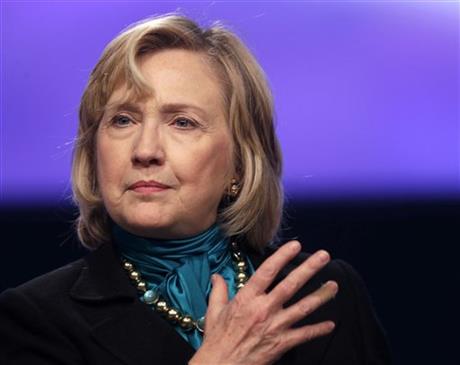WASHINGTON (AP) — Hillary Rodham Clinton’s advisers sought to humanize what they saw as her stern, defensive public image during her husband’s White House days and as she embarked on her groundbreaking Senate campaign in New York.

Be real, wrote adviser Mandy Grunwald in a July 1999 memo as Clinton prepared for a Senate campaign. In the memo, the adviser urged the first lady to look for opportunities for humor. It’s important that people see more sides of you, and they often see you only in very stern situations.
Thousands of pages of documents released Friday by the Clinton Presidential Library reveal the first lady’s struggles with the health care plan during the 1990s, an aversion to the Washington press corps and her transition into a political candidate in her own right as the Clinton administration ended.
Clinton is the leading Democratic contender to succeed President Barack Obama, though she has not said whether she will run. The nearly 4,000 pages of records, the first of more than 25,000 expected to be released in the next two weeks, underscore her attempts to appeal to average Americans and her aides’ advice that she show a more human side, reminiscent of problems that surfaced in her 2008 primary loss against Obama.
Clinton’s public image has been a hotly debated topic throughout her career and could linger into any presidential campaign in 2016. She generated headlines during her husband’s 1992 campaign when she defended her work as an attorney instead of being someone who could have stayed home and baked cookies. Her role in the health care reform effort was criticized as Democrats were routed in the 1994 elections. Establishing herself in the Senate, Clinton lost to Obama in the 2008 Democratic primary but has become one of the most admired women in the world, watching her popularity grow as Obama’s secretary of state.
The documents provide more details about the concerns in her own camp about how she was perceived by the public.
As the first lady began her bid for the Senate seat, Grunwald coached her to keep her tone conversational and don’t be defensive when handling annoying questions from the media. Grunwald said Clinton was sure to be asked about her husband’s Senate impeachment trial earlier that year and encouraged her to acknowledge that of course last year was rough.
At the White House, Clinton’s press secretary, Lisa Caputo, encouraged the first couple to capitalize on their 20th wedding anniversary as a wonderful opportunity for Hillary and also suggested she spend more time doing White House events celebrating first ladies of the past.
In a lengthy August 1995 memo to Clinton adviser Maggie Williams, Caputo wrote that the first lady had an aversion to the national Washington media and suggested staffers in Hillaryland socialize more with members of the press corps as a way to help the first lady, saying it would humanize her and show the press the good person that she is.
I believe if we were all out there consistently, we would erode the notion in the press that sometimes exists of Hillary being in a bunker mentality.
The memo even proposed the wild idea of having Clinton do a guest appearance on a popular sitcom of the day, Home Improvement, which might present Hillary in a very likable light.
As she prepared for a 1995 trip to China and Mongolia — Mrs. Clinton famously declared at a United Nations conference in Beijing that human rights are women’s rights, and women’s rights are human rights — her staff advised her on the press corps who would be traveling with her, noting who was fair or fans of Clinton.
The documents also speak to Clinton’s failure to pass a sweeping health care law, an early blow to her standing and perhaps a liability should she seek the presidency in 2016. The ill-fated proposals in 1993 and 1994 became a Republican rallying cry in midterm elections that gave the GOP control of the House and Senate.
As obstacles mounted in September 1993, Clinton told House and Senate Democrats that unfortunately, in the glare of the public political process, we may not have as much time as we need for that kind of thoughtful reflection and research.
The meetings also showed that Clinton was doubtful that a health care law with a universal mandate — requiring people to carry health insurance — would be approved. In 2007, when she ran for president, Clinton made the individual mandate a centerpiece of her health care plan.
But it was Obama who shepherded into law a health care proposal in 2010 that has many similarities to the Clintons’ efforts, including a requirement for all individuals to carry insurance. Republicans have signaled their intention to make it an issue if Clinton runs.
___
Associated Press writers Charles Babington, Stephen Braun, Henry C. Jackson, Pete Yost, Laurie Kellman, Donna Cassata and Connie Cass in Washington and Jill Zeman Bleed in Little Rock, Ark., contributed to this report.
___
Follow Ken Thomas on Twitter athttp://www.twitter.com/AP_Ken_Thomas
Follow Philip Elliott at http://www.twitter.com/Philip_Elliott





